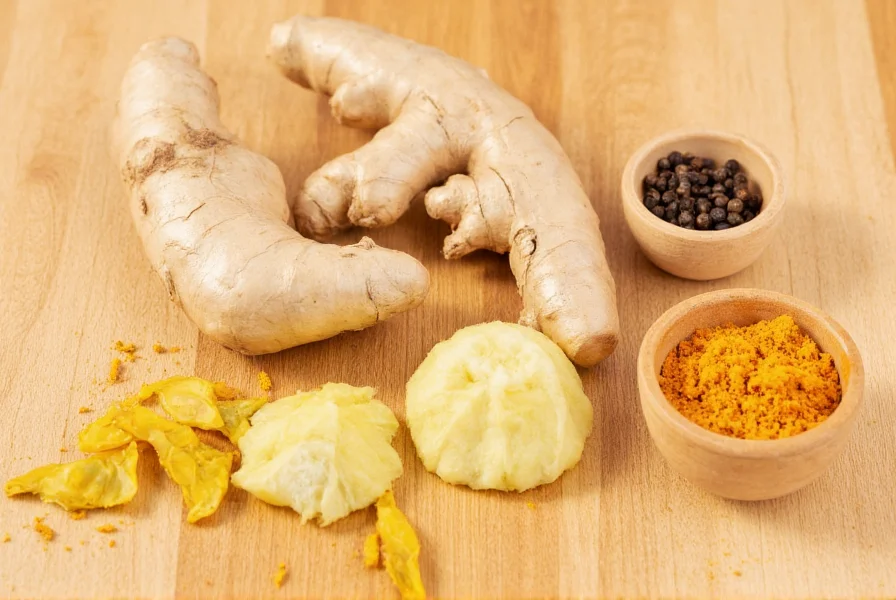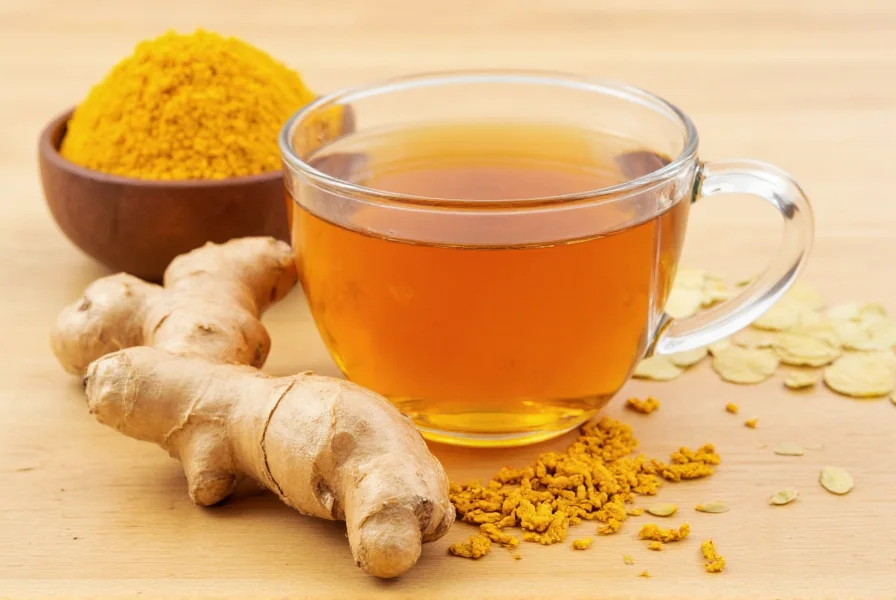Ginger and turmeric tea has gained significant popularity as a natural wellness beverage, and for good reason. This golden-hued infusion combines ginger root (Zingiber officinale) and turmeric root (Curcuma longa), both containing bioactive compounds with substantial scientific backing for their health-promoting properties. Unlike many wellness trends, the benefits of ginger and turmeric tea are supported by decades of research in traditional medicine systems and modern scientific studies.
When preparing ginger and turmeric tea for maximum effectiveness, understanding the science behind these ingredients is crucial. Ginger contains gingerols and shogaols, while turmeric's primary active compound is curcumin. Research published in the Journal of Medicinal Food indicates that curcumin demonstrates potent anti-inflammatory effects, though its bioavailability is enhanced when combined with black pepper (containing piperine) and healthy fats. Similarly, ginger's compounds have been studied for their effectiveness in supporting digestive health and reducing nausea.
The Scientific Basis of Ginger and Turmeric Benefits
Understanding the active compounds in ginger and turmeric tea helps explain why this beverage has maintained relevance across various traditional medicine systems. Modern research continues to validate many of these traditional uses while providing insight into proper preparation methods.
| Compound | Source | Key Properties | Research-Supported Benefits |
|---|---|---|---|
| Gingerol | Fresh ginger root | Anti-inflammatory, antioxidant | Digestive support, nausea reduction, pain relief |
| Shogaol | Dried/processed ginger | Enhanced bioavailability | Stronger anti-inflammatory effects than gingerol |
| Curcumin | Turmeric root | Anti-inflammatory, antioxidant | Inflammation reduction, cellular protection |
| Turmerones | Turmeric root | Complementary compounds | Enhance curcumin absorption and effectiveness |
Documented Health Benefits of Regular Consumption
When exploring the health benefits of ginger and turmeric tea, it's important to distinguish between well-documented effects and areas requiring more research. Current scientific literature supports several key benefits:
Digestive System Support
Multiple studies, including research in the European Journal of Gastroenterology & Hepatology, have demonstrated ginger's effectiveness in supporting healthy digestion. The compounds in ginger help stimulate digestive enzymes and promote gastric motility. When preparing ginger and turmeric tea for digestion, using fresh ginger and allowing it to steep for 10-15 minutes maximizes these benefits.
Inflammation Management
Chronic inflammation underlies many common health concerns, and both ginger and turmeric contain compounds that help modulate the body's inflammatory response. A comprehensive review in Foods journal noted that curcumin's anti-inflammatory effects compare favorably with certain conventional medications, though without the same side effect profile. For optimal anti-inflammatory benefits from ginger and turmeric tea, include a pinch of black pepper and a small amount of healthy fat like coconut oil.
Immune System Modulation
Both ingredients in this powerful tea blend demonstrate immunomodulatory effects. Unlike immune boosters that stimulate the system indiscriminately, ginger and turmeric help regulate immune function. This makes ginger and turmeric tea particularly valuable during seasonal changes when balanced immune function is crucial.
Proper Preparation for Maximum Benefits
How you prepare ginger and turmeric tea significantly impacts its effectiveness. Many people miss key steps that enhance the bioavailability of the active compounds:
- Fresh ingredients: Use fresh ginger and turmeric roots rather than powders for higher concentrations of active compounds
- Proper steeping time: Simmer sliced roots for 10-15 minutes to extract maximum benefits
- Enhance curcumin absorption: Add a pinch of black pepper (piperine increases curcumin absorption by up to 2000%)
- Fat inclusion: Add a small amount of healthy fat like coconut oil or ghee to improve absorption of fat-soluble compounds

Potential Considerations and Side Effects
While ginger and turmeric tea benefits are well-documented, certain considerations ensure safe consumption:
- Blood thinning effects: Both ginger and turmeric have mild blood-thinning properties. Consult your healthcare provider if taking anticoagulant medications.
- Gastrointestinal sensitivity: Some individuals may experience mild stomach upset, especially with higher concentrations. Start with smaller amounts when first incorporating ginger and turmeric tea into your routine.
- Optimal consumption amounts: Research suggests 1-3 cups daily provides benefits without risk of adverse effects for most healthy adults.
- Pregnancy considerations: While small amounts in culinary use are generally considered safe, consult your healthcare provider about therapeutic consumption during pregnancy.
When to Drink Ginger and Turmeric Tea
The timing of consumption affects how you experience the benefits of ginger and turmeric tea:
- Morning consumption: Drinking ginger and turmeric tea in the morning supports digestion throughout the day and provides gentle metabolic stimulation
- Before meals: Consuming 20-30 minutes before meals enhances digestive enzyme production
- Evening consumption: The anti-inflammatory properties may support recovery while you sleep, but avoid late evening if ginger's stimulating properties affect your sleep
- During seasonal transitions: Increased consumption during weather changes supports immune system balance
Fresh vs. Powdered: Maximizing Your Tea's Effectiveness
When making ginger and turmeric tea at home, understanding the differences between fresh and powdered forms helps optimize your preparation:
- Concentration of active compounds: Fresh roots contain higher concentrations of volatile compounds that degrade during the drying and powdering process
- Shelf life considerations: Fresh roots last 2-3 weeks refrigerated, while powders maintain potency for 6-12 months when stored properly
- Preparation differences: Fresh roots require grating or slicing and longer steeping, while powders dissolve more quickly but may create sediment
- Taste profile: Fresh roots provide brighter, more complex flavor profiles compared to the more concentrated but sometimes bitter taste of powders
For those seeking the most effective ginger and turmeric tea preparation, using fresh roots with proper enhancement techniques delivers superior results compared to commercial tea bags, which often contain lower concentrations of active compounds.
Frequently Asked Questions
What are the primary health benefits of ginger and turmeric tea?
Ginger and turmeric tea offers several research-supported benefits including digestive support, inflammation management, and immune system modulation. The gingerol in ginger helps stimulate digestive enzymes and reduce nausea, while curcumin in turmeric demonstrates potent anti-inflammatory properties. When properly prepared with black pepper and healthy fats, these compounds work synergistically to support overall wellness without the side effects associated with some conventional approaches.
How often should I drink ginger and turmeric tea for optimal benefits?
For most healthy adults, consuming 1-3 cups of properly prepared ginger and turmeric tea daily provides optimal benefits without risk of adverse effects. Research suggests consistent daily consumption yields better results than sporadic use, as the compounds build up in the system over time. Those new to this tea should start with one cup daily to assess tolerance before increasing consumption.
Can ginger and turmeric tea help with joint pain and inflammation?
Multiple studies indicate that the compounds in ginger and turmeric tea may help manage inflammation associated with joint discomfort. Research published in the Journal of Medicinal Food found that curcumin's anti-inflammatory effects compare favorably with certain conventional approaches. For best results when using ginger and turmeric tea for inflammation, include black pepper to enhance curcumin absorption and consume consistently over several weeks, as the effects build gradually.
What's the best way to prepare ginger and turmeric tea for maximum effectiveness?
The most effective preparation method for ginger and turmeric tea involves using fresh roots, simmering them for 10-15 minutes, and adding enhancers to maximize bioavailability. Grate 1-inch of fresh ginger and 1-inch of fresh turmeric, simmer in 2 cups of water, then add a pinch of black pepper and 1/2 teaspoon of coconut oil or ghee. This combination significantly increases the absorption of curcumin, making the health benefits of ginger and turmeric tea substantially more effective than basic preparations.
Are there any side effects I should be aware of with regular consumption?
While ginger and turmeric tea is generally safe for most people, some considerations exist. Both ingredients have mild blood-thinning properties, so consult your healthcare provider if taking anticoagulant medications. Some individuals may experience mild digestive upset when first introducing higher concentrations. Those with gallbladder issues should consult a healthcare provider before regular consumption. As with any natural remedy, moderation is key - 1-3 cups daily is sufficient for most healthy adults seeking the benefits of ginger and turmeric tea.











 浙公网安备
33010002000092号
浙公网安备
33010002000092号 浙B2-20120091-4
浙B2-20120091-4